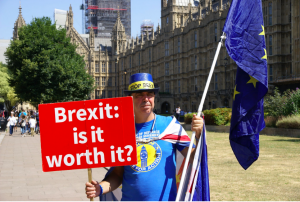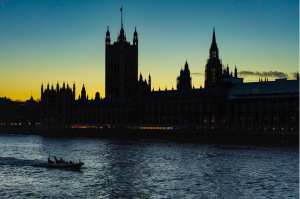By RightsViews Staff Writer Lindsey Alpaugh
On December 13th, Dominic Raab outlined a “sweeping overhaul” of the current Human Rights Act in the United Kingdom. Raab, who serves as Deputy Prime Minister, Secretary of State for Justice, and Lord Chancellor, said that “the reforms will strengthen “typically British rights” and add a “healthy dose of common sense” to the interpretation of legislation and rulings.” It was revealed earlier this year that Raab, said, “I don’t support the Human Rights Act and I don’t believe in economic and social rights,” in a previously unreleased tape from 2009.
The original piece of legislation was introduced in 1998, and permitted the European Convention on Human Rights to be implemented as domestic legislation. The legislation entails provisions including “basic rights to a fair trial, life and freedom from ill treatment – and protections against discrimination or unfair interference in private and family life.” The United Kingdom was the first signatory to that convention. Additionally, the United Kingdom is a member of the European Court of Human Rights (ECtHR), which is based in Strasbourg. The ECtHR is separate from the European Union and therefore not included in Brexit.
The two primary critiques of the update are that the rewrite is motivated by anti-European sentiment and a desire to weaken the judiciary.
Anti-European Sentiment

The Daily Mail writes of Raab, “speaking at the Conservative Party conference last month he said the UK’s Supreme Court ‘should be supreme in relation to human rights law’.” While European Human Rights law, both the convention and the court, are not legally impacted by Brexit, it is clear that the sentiment of prioritizing distinctly British legal traditions over continental legal practice has carried over. The BBC reports that “the HRA has been under repeated attack from critics on the right of politics who say that it puts European law ahead of British law.” By rewriting the law, Raab is attempting a distinct human rights tradition in the United Kingdom. The Daily Mail’s Jason Groves and David Barrett also stated that it is expected that Raab would withdraw The United Kingdom from the European Court of Human Rights.
One of the most commented on provisions in the new act is editing Article 8, the right to family life. As per the BBC, Raab claims that this provision “would prevent what he called “abuse of the system” by criminals “relying on Article 8 – the right to a family life – to frustrate their deportation from this country.”He said such claims make up about 70% of successful human rights challenges by foreign national offenders appealing deportation orders.”
Raab claims that the right to a family life prevents the United Kingdom from deporting “serious criminals,” and would like to simplify the deportation process. This is troubling in the wake of recent stories outlining an eagerness by the United Kingdom to deny immigrants the ability to appeal deportation sentences and a rush to deport asylum seekers.
Reported by the Independent, Shadow Justice Secretary for the Labour Party Steve Reed called the announcement a “dead cat distraction tactic by a government who do not know how to fix the criminal justice system that they have broken.”
Judiciary power in the UK

The rewrite comes in the wake of critiques around the current UK government’s attempts to curtail judiciary power within the country. Much like Raab’s desire to give the government much greater ease in deporations, much of the act reflects a desire to shift human rights power to the Executive from the Judiciary. The issue with that action is that, particularly with Human Rights cases, the Judiciary often serves as a balance to executive powers. From Rajeev Syal of the Guardian, “Martha Spurrier, the director of the human rights group Liberty, said: ‘This plan to reform the Human Rights Act is a blatant, unashamed power grab from a government that wants to put themselves above the law. They are quite literally rewriting the rules in their favor so they become untouchable.”The Independent stated that many critics of the law point out that the law comes in the wake of the government’s loss in many judicial reviews on the basis of Human Rights.
From the Editorial Board of the Financial Times, “reading the proposals in isolation misses a wider point. This is a government that has already proposed curtailing courts’ ability to scrutinize its decisions and those of public authorities. It is a government that has consistently attempted to strengthen executive power by weakening other checks and balances. More weight might be given to its claims of reinforcing the primacy of UK courts over Strasbourg — which they have in any case — if it were not simultaneously trying to hobble judicial oversight elsewhere.” This point underscores the fundamental contradiction of this legislation– while it may appear to be designed to celebrate British legal tradition, it undermines the power of national courts in favor of the legislators.
The consultation period for the law closes in March, which likely would leave the legislation for the 2022-2023 session of parliament. It is possible that this legislation could be a talking point for the 2024 election.
Photos*
Featured Image: “By The Rich & For The Rich = Brexit” by philipstorry is licensed under CC BY-NC-SA 2.0. To view a copy of this license, visit https://creativecommons.org/licenses/by-nc-sa/2.0/?ref=openverse&atype=rich
“Brexit Demonstrator” by ChiralJon is licensed under CC BY 2.0. To view a copy of this license, visit https://creativecommons.org/licenses/by/2.0/?ref=openverse&atype=rich
“Dark Parliment #Brexit” by Gordon-Shukwit is licensed under CC BY-NC-ND 2.0. To view a copy of this license, visit https://creativecommons.org/licenses/by-nd-nc/2.0/jp/?ref=openverse&atype=rich
